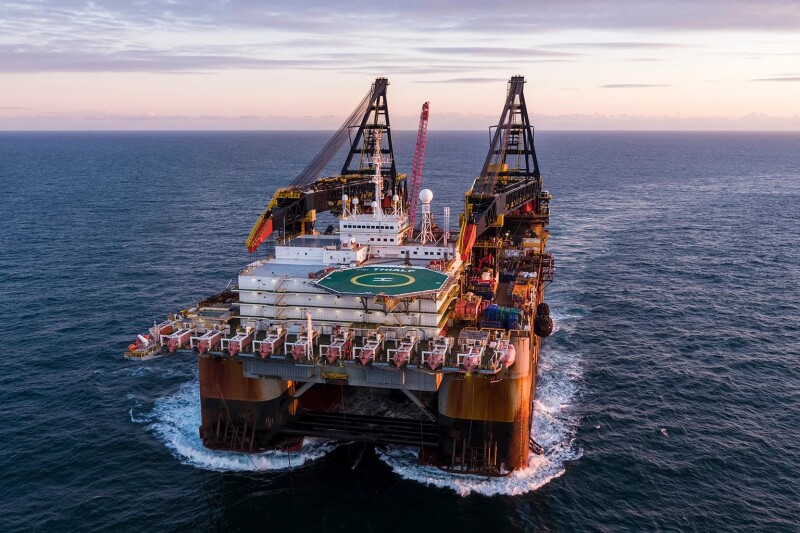Commercial fishermen and opponents of the Empire Wind project asked a federal court to immediately halt pile driving and construction activity, weeks after the Trump administration allowed construction to resume.
The coalition, which filed a lawsuit June 3 in U.S. District Court, returned to ask for a preliminary injunction June 12, according to the group Protect Our Coast New Jersey.
Energy company Equinor would build an array of 54 turbines on its 80,000-acre federal lease near the approaches to New York Harbor. The plan dates back to December 2016 when Equinor (then known as Statoil) first won a lease sale by the federal Bureau of Ocean energy Management.
Commercial fishing advocates have long opposed wind projects in the area, citing nearby fishing grounds like the Mud Hole and Cholera Bank with historic mixed trawl fisheries, and sea scallops, the Mid-Atlantic’s most valuable fishery.
Protect Our Coast New Jersey contends the renewed construction poses
“To allow Empire Wind to continue construction is to abandon us fishermen and our coastal communities who have, for generations, fed our great country and kept local economies thriving,” said captain Shawn Machie of the F/V Capt. John in New Bedford, Mass., in a joint statement by the plaintiffs. “To turn a blind eye to the marine mammal deaths and destruction of ocean habitats is careless and shows a greed unlike any I’ve ever encountered.”
The lawsuit seeks to have Secretary of the Interior Doug Burgum reinstate a stop-work order he directed BOEM to post in mid-April, as the Trump administration moved against offshore wind projects.
After quiet negotiations with New York State Gov. Kathy Hochul, the Trump administration suddenly reversed course in mid-May, allowing Empire Wind to resume construction and the Hochul administration agreeing to cooperate on new Northeast natural gas pipelines.
Equinor and contractors stepped up activity within days of the new decision, with the Thialf, a 661’x290’ semi-submersible crane vessel, operated by Netherlands-based Heerema Marine Contractors, arriving on scene to prepare for turbine installations.
An accidental death was reported after a crewman was electrocuted June 2 on the Tidewater supply vessel Polaris about 27 miles off New York, according to the Coast Guard. The 272'x58' DP2 platform supply vessel has been operating in support of Empire Wind.
The construction resumption brought a backlash from offshore wind opposition groups, who had hailed Burgum’s initial stop-work order. After their bitter criticism of the Trump administration, the plaintiffs’ latest statement took aim again at Equinor and the former Biden administration:
“The Empire Wind 1 project was fast-tracked and approved under the Biden administration, which granted key permits and lease rights before leaving office, enabling a foreign state-owned company to destroy American waters so Norway can profit, despite widespread warnings from fishermen, scientists, and coastal communities.”
The plaintiffs are challenging the legality of Equinor’s lease under the Outer Continental Shelf Lands Act (OCSLA), a 1951 federal law governing offshore leasing. Their lawsuit contends Equinor is “majority-owned by the Kingdom of Norway. U.S. law bars foreign governments from holding offshore energy leases.”
The Fisherman’s Dock Cooperative in Point Pleasant Beach, N.J., founded in 1953, “is one of the oldest and most successful fishing cooperatives in the country,” said Gus Lovgren, a multi-generational fisherman and co-op spokesman.
It’s also been a center of resistance to offshore wind proposals, dating back to concepts initially proposed by BOEM energy planners during the first Obama administration.
“For over 70 years, we’ve passed down our heritage and our commitment to sustainable fishing,” said Lovgren. “But Empire Wind is a wrecking ball. It’s not just destroying our ocean, it’s destroying our future. It just took away our tomorrow.”
The New England Fishermen’s Stewardship Association (NEFSA) is not a party to the case, but says it “strongly supports the plaintiffs.”
“Empire Wind has sought to industrialize our oceans and put thousands of American fishermen and coastal communities out of business,” said Jerry Leeman, NEFSA’s CEO. “This foreign-owned company violates federal law, destroys critical fishing grounds, and wreaks havoc on marine life and the ecosystem.”




